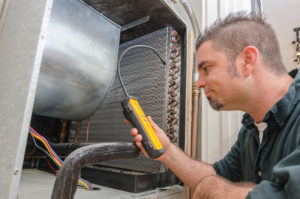 Under normal conditions, you shouldn't have to add refrigerant to your HVAC system. The refrigerant doesn't get consumed – it travels in a loop through the system, absorbing heat at the indoor evaporator coil, and releasing it at the condenser coil into the outdoor air. When there's an HVAC leak, you may be able to detect it by these telltale signs:
Under normal conditions, you shouldn't have to add refrigerant to your HVAC system. The refrigerant doesn't get consumed – it travels in a loop through the system, absorbing heat at the indoor evaporator coil, and releasing it at the condenser coil into the outdoor air. When there's an HVAC leak, you may be able to detect it by these telltale signs:
Higher Energy Bills
A system that's gradually leaking refrigerant will work harder and consume more energy as it tries to satisfy the temperature setting on your thermostat.
Decline in Cooling Capabilities
As the amount of refrigerant flowing through the system drops, your equipment's cooling capabilities will diminish too. You'll find that your home doesn't feel as cool as usual, even though you lower the thermostat setting.
Warmer Air Coming From the Registers
If you check the airflow coming out of the registers at this point, you'll likely notice that the air feels warmer than normal.
Hissing Noise From the Air Handler or Outdoor Unit
Hissing or gurgling sounds coming from the indoor evaporator or outdoor condenser coil is a sure sign of a refrigerant leak. However, listening for these sounds isn't a foolproof detection method, because leaks can also occur along the refrigerant lines.
Ice on the Evaporator Coil
With a low level of refrigerant due to leaks, the evaporator coil won't adsorb heat well. When this occurs, condensation on the coil can start to freeze and build up.
If you believe there's a refrigerant leak in your HVAC system, it's best to have an HVAC professional investigate further, so it can be repaired and the system recharged with refrigerant. Here are some of the methods a pro might use:
- Applying soap to a suspected leak source to see if bubbles form.
- Adding fluorescent dye to the refrigerant line, then checking for leaks with an ultraviolet (UV) light.
- Using an electronic detector that employs ultrasonic sound, corona discharge, heated diode or electrolyte, or infrared technology.
Contact us at Hartman Brothers Heating & Air Conditioning if you need expert help detecting and fixing an HVAC leak in your Fort Wayne home.
